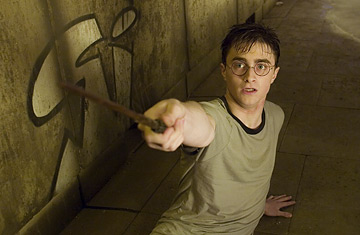
Daniel Radcliffe in Harry Potter and the Order of the Phoenix
(2 of 3)
THE PHOENIX RISES
Meantime, like a fraternal twin on a planet with a slightly slower orbit, the fifth Harry Potter film arrives in theaters today. Eleven days later, readers will soon discover their young hero's destiny. But for now, in movies, Harry is still trying to figure out the scheme Lord Voldemort has hatched and pondering if a teenage boy is up to thwarting it.
Another mystery — whether a new director, David Yates, and scriptwriter, Michael Goldenberg, can build on the intelligent urgency of the past two Potter films — is cleared up in the first few minutes as Harry performs some impromptu magic to save Dudley Dursley, his foster parents' bullying son, who has been set upon by boys even more rancid than he. The confrontation is swift, vivid, scary and, to the audience, assuring: Harry Potter and the Order of the Phoenix will be a good one. Fully as satisfying, it turns out, as the excellent third and fourth movies in the series. The tone and palette are darker, the characters more desperate and more determined.
For saving Dudley's life (and flaunting his wizardly powers in the Muggles' demimonde), Harry is briefly expelled from Hogwarts. He has a knack of getting in trouble for behaving heroically, which has to appeal to kids' sense of isolation from the adult world that Just Doesn't Understand — to their feeling that they have a lock on values, while adults are mired in ethical compromise. That suspicion suits Harry as he enters his outlaw phase, his overt rebellion against Hogwarts, or rather against the woman who has commandeered the school on behalf of a misguided, possible venal Ministry of Magic.
Her name is Dolores Umbridge (Imelda Staunton), and she's on assignment to bring discipline to Hogwarts. Pink and perky, her office walls covered with moving pictures of cats, she begins by using her wand for seemingly harmless discipline: straighten boys' ties and tuck their shirttails inside their trousers. Soon she's the students' nightmare: a cheery commissar, a suburban Stalinist with a smile like a rictus.
That would make Harry the underground resister. He knows he can't fight Umbridge, let alone Voldemort, on his own. So he leads his fellow students on a children's crusade, serving as their professor at a guerrilla class in magic. And he enlists his godfather, Sirius Black (Gary Oldman), and Mad-Eye Moody (Brendan Gleeson) to help fight Umbridge's assault on Hogwarts and its leader, Albus Dumbledore (Michael Gambon).
Whatever else she's achieved in her saga, Rowling has succeeded in creating an alternative England — that endearingly eccentric, most likely imaginary place once found in popular Brit culture. That's one reason the series has translated so smoothly from page to screen. The majestic Dumbledore, the rural galoot Hagrid (Robbie Coltrane), the middle-crass Dursleys (Richard Griffiths and Fiona Shaw) are all recognizable, if not from life, then from Agatha Christie novels and Ealing comedies. These ripe characters are played by distinguished actors so adept at stealing scenes, it's a wonder any are left to play. The Potter films are almost shamefully rich in the quality of their supporting cast. With Fiennes, Oldman, Gambon, Gleeson, Shaw, Griffiths, David Thewlis, Alan Rickman, Julie Christie, Emma Thompson, Julie Walters and now Staunton ready and willing to fill the crevices of plot, the movies' producers — and their audiences — should murmur a grateful, "Ah, England!"